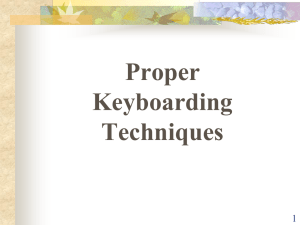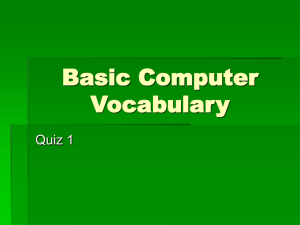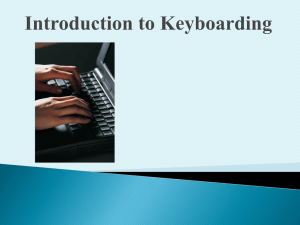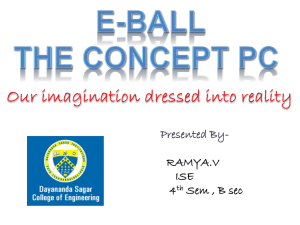ARTICULATION DOCUMENT T110 Music Theory & Keyboard Skills
advertisement
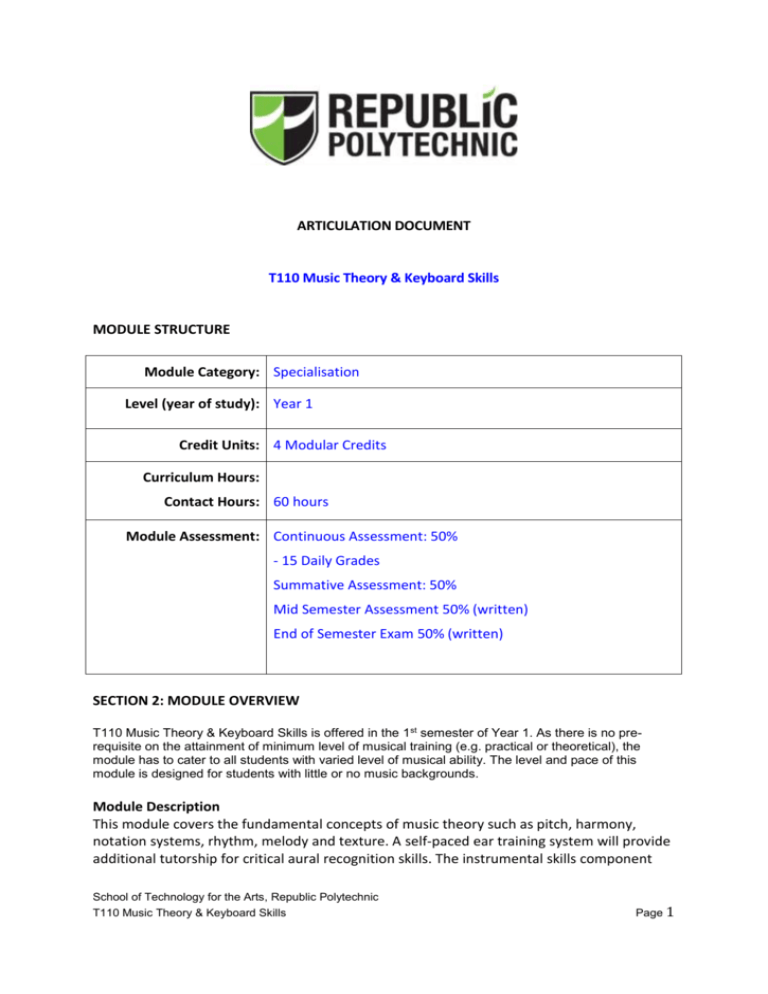
ARTICULATION DOCUMENT T110 Music Theory & Keyboard Skills MODULE STRUCTURE Module Category: Specialisation Level (year of study): Year 1 Credit Units: 4 Modular Credits Curriculum Hours: Contact Hours: 60 hours Module Assessment: Continuous Assessment: 50% - 15 Daily Grades Summative Assessment: 50% Mid Semester Assessment 50% (written) End of Semester Exam 50% (written) SECTION 2: MODULE OVERVIEW T110 Music Theory & Keyboard Skills is offered in the 1st semester of Year 1. As there is no prerequisite on the attainment of minimum level of musical training (e.g. practical or theoretical), the module has to cater to all students with varied level of musical ability. The level and pace of this module is designed for students with little or no music backgrounds. Module Description This module covers the fundamental concepts of music theory such as pitch, harmony, notation systems, rhythm, melody and texture. A self-paced ear training system will provide additional tutorship for critical aural recognition skills. The instrumental skills component School of Technology for the Arts, Republic Polytechnic T110 Music Theory & Keyboard Skills Page 1 will provide foundational performance skills on a keyboard or selected instruments, which may be used in conjunction with digital audio workstations. This module is a pre-requisite for T215 Music Theory & Practice, and T315 Music Composition. Learning objectives 1. 2. 3. 4. 5. To enable students acquire fundamentals of music and audio; To introduce to students the basic materials in music theory; To enable students to acquire basic skills in keyboard performance; To introduce to students music of various period and styles; To introduce to students basics in musical communication using standard music notation scores; 6. To introduce to students the basics of music technology e.g. MIDI note triggering. Module Approach Facilitation is divided into 2 components – (1) Seminar & Tutorial & (2) Keyboard Practical Session. Each of these components will consume 2 hours of the block mode. Class is hence divided into 2 groups with each group taking either component for the first 2 hours and swapping over for the final 2 hours, to complete the entire 4-hour block mode learning. Assessment weighs substantially on worksheet, keyboard practice as well as RJ submission. MODULE OUTCOMES AND LEARNING OUTCOMES Allocated time per day Module Coverage Discussions in Study Cluster Resource gathering and team work Skills acquisition and practice T110 Music Theory & Keyboard Skills covers the fundamental concepts of music theory such as pitch, harmony, notation systems, rhythm, melody and texture. A self-paced ear training system will provide additional tutorship for critical aural recognition skills. The instrumental skills component will provide foundational performance skills on a keyboard or selected instruments, which may be used in conjunction with digital audio workstations. This module is a prerequisite for T215 Music Theory & Practice, and T315 Music Composition. Total = 60 hours School of Technology for the Arts, Republic Polytechnic T110 Music Theory & Keyboard Skills Page 2 TEACHING AND LEARNING This module includes a self-directed keyboard skills lab. Students are provided with practice manual and sheet music to acquire basic skills in keyboard techniques through self-directed learning. In order to attain maximum benefit for the brief period in this module that we have allocated basic keyboard skills to, a problem-based approach to each lesson was taken to encourage life-long learning. This module will present a up to a third of its lessons on keyboard skills introduction training and the rest on music theory using score sheets and notation software. The learning outcomes of this module are designed to prepare students for more in-depth practical training during the course of higher-level DSA specialisation modules such as T215, T315 and T313. Overall, the module presents easy to moderately challenging problems. They are to be multi-faceted as they deal with concepts beyond music theory and included general musicianship skills, audio production and music technology. LEARNING RESOURCES Facilities - Notation software, Sibelius in Vista C, Vista D & Synthesis Lab Pro Tools LE8 on student’s laptop and Pro Tools v9 v10 in Vista C & D Free notation software, Finale Notepad http://www.finalemusic.com/NotePad MuseScore http://musescore.org/ or Noteflight http://www.noteflight.com/login MIDI Controllers (Keyboard interface) M Audio 88keys & Axiom 25 available in Vista C & D suites Online resources - - Ricci Adams Music theory.net http://www.musictheory.net/ Teoría Music Theory Web http://www.teoria.com/tutorials/index.php Free lessons and resources in Music Theory http://music-theory.ascensionsounds.com/ Chord House http://www.looknohands.com/ Music Theory Online 1000+ Scales http://www.dolmetsch.com/pianochords.htm Virtual Keyboard http://www.bgfl.org/bgfl/custom/resources_ftp/client_ftp/ks2/music/piano/index.htm Vienna Symphonic Library Instruments Online http://www.vsl.co.at/en/70/149/150/46.vsl Reading list - Grove, Dick Fundamentals of Modern Harmony Book 1 (Dick Grove Modern Harmony - Miller, M. The Complete Idiot’s Guide To Music Theory Alpha Publisher 2005 Series) Alfred Publishing 1985 Taylor, E. The AB Guide To Music Theory Part I ABRSM (Publishing) Ltd 1991 Taylor, E. The AB Guide To Music Theory Part II ABRSM (Publishing) Ltd 1991 Prosser, S Essential Ear Training for the Contemporary Musician Berklee Press 2000 Gorow, R. Hearing and Writing Music: Professional Training for Today's Musician (2nd Edition)September Pub 2002 Kostka, Steve Tonal Harmony, 6th Edition McGraw-Hill 2008 Aldwell, Edward Harmony & Voice Leading, 4th Edition Schirmer 2010 Schmeling, Paul Berklee Music Theory 1, 2nd Edition Berklee Press 2011 Schmeling, Paul Berklee Music Theory 2, 2nd Edition Berklee Press 2011 School of Technology for the Arts, Republic Polytechnic T110 Music Theory & Keyboard Skills Page 3
